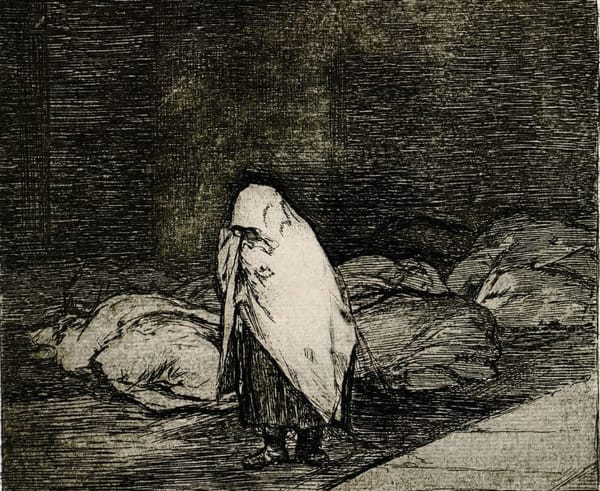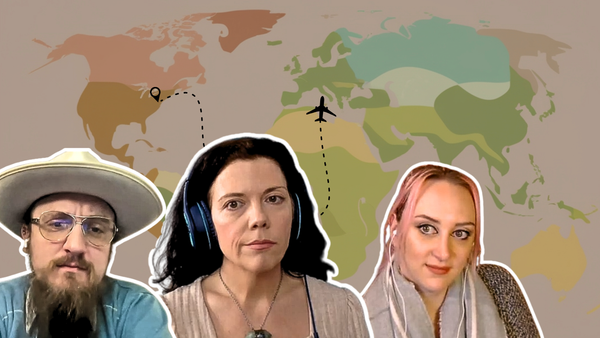Yes, It’s the Guns. It’s Also the Phones.
Life online is corroding the virtues that make liberal democratic life tenable.

A Democratic lawmaker and her husband were killed in their Minnesota home. A gunman killed a police officer in an attempt to assault the CDC headquarters in Atlanta. Two Colorado teenagers were hospitalized after another, radicalized teenager shot them. And a right-wing activist was shot dead in front of a crowd of college students in Utah. All of this unfolded in the last three months.
A confounding aspect of where we are right now as a country is that the everyday person in their home or workplace is horrified and frightened by acts of violence, political or otherwise. But the people we are online are often not. Moreover, who we are online matters deeply for the state of our democracy and the nature of our society. It’s no longer tenable, in the year 2025, to delineate between the digital world and “real life.” The bile we swim in daily, sometimes for hours on end, is corroding the virtues that make liberal democratic life tenable. And, even among the most responsible of us, the deleterious effects of engaging our fellow citizens through a screen are nearly impossible to avoid.
The era of rising fascism in interwar Europe saw violence spill into the streets, as partisans engaged in street warfare like Berlin’s Blutmai and London’s Battle of Cable Street. Over the course of the late 19th century in the United States, the country roiled as it emerged from the Civil War and fought to emerge as a more complete democracy. From Lincoln to McKinley, three presidents were assassinated.
Historian Jon Grinspan argues in his book, The Age of Acrimony: How Americans Fought to Fix Their Democracy, 1865-1915:
20th century America’s expectations of restrained public politics were a historical outlier. That civility was an invention, the end result of a brutal fight over the nature of democracy that raged across American life in the late 1800s…Racist terrorism during Reconstruction, political machines that often operated as organized crime syndicates, and the brutal suppression of labor movements made the deadliest era in American political history.
Of course, the 1960s were also infamously turbulent and violent. Shocking police and protester clashes rocked the 1968 DNC. Assassins claimed the lives of John F. Kennedy, Robert Kennedy, Medgar Evers, Dr. Martin Luther King Jr., and more.
Our environment today is different. The nature of our extremism has changed, and party foot soldiers don’t typically menace one another in public squares. But in the spaces where many who are inclined toward deep political engagement spend their time, the atmosphere is thick with rage, contempt, and a punishing layer of dehumanizing detachment.
On X, on Reddit, on Bluesky, and elsewhere, there is brawling and venom. Heartless glee and pathological opportunism trail our public tragedies without fail. In less heated moments, we are simply being slow-cooked in an environment that conditions us to lean on our most anti-social impulses. Online, America is in a frighteningly combustible condition. In a Friday article for The New York Times, Sheera Franken and Stuart A. Thompson reported:
The term “civil war” was mentioned on Wednesday more than 129,000 times on the social platform X, according to an analysis by The New York Times. On Thursday, it was mentioned at least 210,000 times.
I realize that in indicating our online worlds I am not saying anything particularly new. And yet it has to be said, because the crisis will not abate.
Utah Governor Spencer Cox was right in one sense when he declared that “Words are not violence. Violence is violence.” But this also misses just how toxic our online ecosystems have become and how the platforms and devices we use short-circuit our humanity.
There is evidence that social media and digital interactions fundamentally undermine our capacity to exercise and build empathy. As Dr. Helen Riess argues in her book, The Empathy Effect, this is largely because we rely on things like eye contact and body language to communicate additional information, build connections, and intuit other people’s emotional states. As she explained in one interview with Street Roots:
When we communicate digitally, most often, we’re not seeing the person’s face with whom we’re speaking. We don’t see their posture, we don’t pick up on physical cues like facial flushing or maybe a misty eye or a little tear, or even looks of surprise or startle, unless we’re FaceTiming, where of course you do see the face. In texting, email and telephone conversations, we are missing out on many layers of how we understand other people’s emotional states.
We aren’t just failing to see the humanity in each other in our individual exchanges online. We have also become careless about the kinds of content we throw out to anonymous followings, especially in moments where caution and compassion would be most beneficial.
When an act of violence rips through society, footage of it often tears its way across social media—unassuming users, including children, and voyeurs alike find themselves watching the unedited murder of other human beings. This is possible because of the same platforms that encourage the very conspiracies, jealousies, and anxieties that are frequently motives for the perpetrators.
What little we know so far about Kirk’s killer suggests that he was incredibly, terminally online. As Tina Ngyuen and Mia Sato reported for The Verge, he “allegedly left engraved bullets at the crime scene that were covered in a furry meme, a reference from the video game Helldivers 2, and an extremely online taunt.” I am not going into detail on Kirk’s killer, both to deny him notoriety and because the investigation is obviously in its early stages. But the role of the internet appears undeniable.
The brain-breaking effects of living our lives through social media are increasingly hard to ignore. One Utah content creator present at the Kirk event immediately took to his TikTok account, plugging his username, encouraging his followers to read the Book of Mormon, and flashing a peace sign and a smile as terrified attendees rushed around him. “It’s your boy, Elder TikTok. There was just a gunshot at Charlie Kirk,” the video began. He’s since issued an apology and expressed regret for the video.
Dismissing all this as the playground of the few and the fringe—as “not real life”—won’t cut it. In the aftermath of Melissa Hortman’s murder, U.S. Senator Mike Lee, operating on X as “Based Mike Lee,” behaved like a malicious online troll. Alongside an image of the killer, Lee wrote “This is what happens when Marxists don’t get their way.” He wrote this despite there being no evidence the killer was a Marxist or affiliated with any sort of left-wing politics. Elsewhere he posted “Nightmare on Waltz Street,” turning the murders into a cheap pun at the expense of Minnesota’s Democratic governor. It was a stunning display of inhumanity from one of the most terminally online elected officials in a terminally online country.
As The Bulwark’s Joe Perticone wrote at the time:
The first step to overcoming any addiction is admitting you have a problem. That’s a step that Lee has not yet taken when it comes to his phone. Perhaps he finds value in being this online. Perhaps it’s good for his political brand, or for fundraising. Maybe he just lives for the liberal tears.
After Kirk’s killing, Lee asked for prayers and praised the activist—a contrast with his response to the Hortman murder that was immediately noted by other observers. Yes, partisan politics certainly shaped Lee’s divergent responses to two different tragedies, but isn’t it also likely that his existing in-person relationship with Kirk did so as well?
Returning to Dr. Riess, she argues,
I find that most people change through conversation and relationship. If you know that you've gotten that dull feeling, talk about it with someone, maybe a sibling, best friend or someone you work with, and see if that person feels the same way.
What our screens and online worlds deny us is the ability to contemplate one another as full people, as fellow humans, and—crucially, for a liberal democratic society—as fellow citizens. And they also deny us the space for self-reflection. I have turned time and again in recent months to philosopher Robert Talisse’s work Civic Solitude. It’s not a call for isolation, but an argument that, for a democratic society to thrive, our lives must be full of vibrant and healthy and social connections and meaningful contemplation of our polity and our place in it. As Talisse urges, “democracy calls for us to see beyond ourselves.”
Our phones can collapse distance but more often than not they cannot provide intimacy. The internet invades our lives when we are on it and when we’re not, pushing in at the edges of our thoughts with all its thrills, joys, anxieties, indiscretions, and torments. For many, more life is lived there than anywhere else. But the risks are as real as can be.




